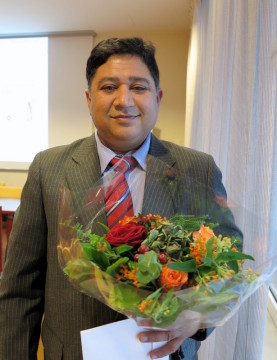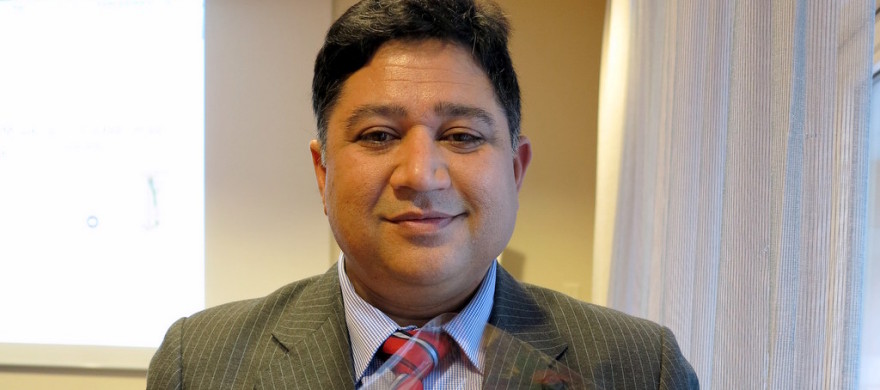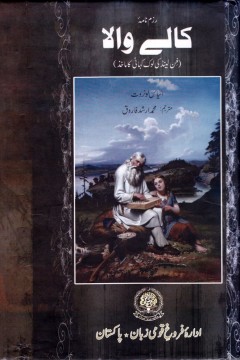Arshad Farooq 2012
Mohammed Arshad Farooq (b. 1963) moved from Pakistan to Finland in 1992. Two decades later his translation of the Kalevala into Urdu was published.

Arshad Farooq was awarded with the Kekrinpäivän prize by the Kalevala Society in 2012. Photo: The Kalevala Society Foundation.
Farooq graduated from the university in Punjab with a master’s degree in social work and with a bachelor’s degree also in social work in Finland. But his love for the Urdu language and old poetry stems from his childhood. Arshad Farooq’s father was a journalist and as a boy, Farooq used to spend a great part of his childhood in his father’s office. His father’s friends also came to the office: journalists, professors, poets. In that cultural atmosphere, Arshad was inspired to read Urdu poetry that was 300–400 years old and also to write poems himself.
His curiosity for the Kalevala was awakened at the women clothes department at the Sokos department store in Helsinki where Arshad Farooq was in the beginning of the 1990’s together with his wife. His wife spoke much about the Kalevala jewellery that was sold at the department store – Farooq did know about the jewellery but what was the Kalevala? His wife explained and he was interested in reading it. However, his language skills were still not sufficient enough to read the original book, but luckily, he found translations of the book in English.
As it happened, the neighbourhood where Farooq lived, in Mellunmäki, was also where Ramalingam Sivalingam from Sri Lanka lived. Sivalingam was currently working on a translation of the Kalevala into Tamil. The men met even a couple of times a day at the metro station and at cafés to discuss their work. “He did not want to invite me into his home, because he had five or six daughters there”, Arshad Farooq says with a smile. It just would not have been appropriate.
Although Pakistani and Finnish culture and poetry also differ from each other when it comes to compatibility, Arshad Farooq has not left anything untranslated in his own translation work. In the same manner as other translators before him, Farooq has conveyed the message of the poems in a way that it can be received by the target language. “The woman is in focus in Indian and Pakistani poetry”, Arshad Farooq says, “women, flowers and romanticism, all poetry exists around these.” It is also important that the things you say in a poem is said beautifully. When Farooq translated poems in the Kalevala that were about a woman’s pregnancy, he had to choose his words with care. The Urdu language gives many possibilities for this. There is no need to be awkwardly direct, but you can refer to pregnancy, for example through swollen feet of through waiting.
Lasting heritage
Arshad Farooq is very happy that by translating the Kalevala into Urdu he has had the chance to do his part and leave his name in the long history of the Kalevala.
According to Farooq, the Urdu language is spoken, as a first or second language, by 117 million people only in Pakistan. In the neighbouring country India, Urdu is spoken by even somewhat more people. The history of poetry in Urdu is very long and prosperous. When Arshad Farooq translated the Kalevala, he used the poetic meter, radif qaafiyaa, in which the end rhymes and repetitions are determining characteristics of its format and rhythm. It is common, not only in poetry in Urdu, but also in poetry in the Persian and Turkish languages.
Based on the interview of Arshad Farooq at the Kalevala Society in 5 Oct 2011 by Petja Aarnipuu ja Ulla Piela.

